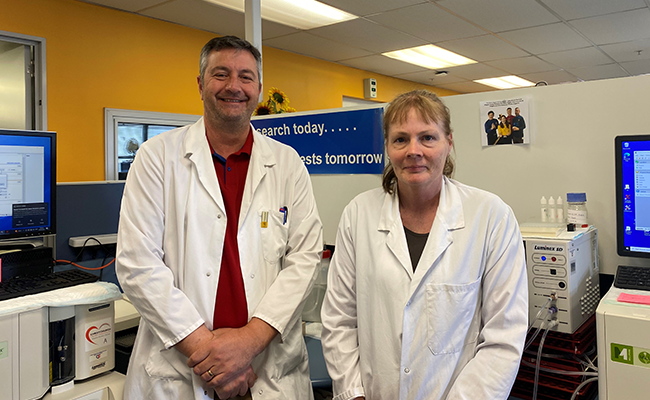
A team led by Professor Chris Pemberton and Ms Sarah Raudsepp, alongside Professors Mark Richards, Richard Troughton, Martin Than and John Pickering (University of Otago, Christchurch) has won this year's $50,000 University of Otago Translational Research Grant (TRG) competition.
The winning project is a new method for rapidly diagnosing heart attacks by significantly improving an existing process.
At present rapid heart attack diagnosis relies heavily on the measurement of a protein called troponin but interfering factors in the blood can skew the results.
The research team at the Christchurch Heart Institute uncovered a potentially unappreciated interfering factor, which when accounted for in trial studies, significantly improves the performance of a troponin test.
“It was a known problem and a lot of straightforward and obvious solutions had been tried so we had to think outside the box to fully understand what was going on,” Professor Pemberton says.
The multi-disciplinary team worked on the problem for about a year before running a successful trial.
Preliminary data from more than 1,000 hospital patients suggests the methods might reduce the false positive and false negative rates of testing, resulting in improved clinical decision making and patient outcomes. It could be used in emergency departments as part of the existing protocol for assessing heart attacks.
“Anything that can help a clinician make a decision quicker and reduce the load on the hospital system is going to be welcomed.”
The Christchurch Heart Institute team of Prof Chris Pemberton (test discovery and design), Sara Raudsepp (specialist technical officer), Profs Mark Richards and Troughton (cardiology), Prof Martin Than (emergency medicine) and Prof John Pickering (clinical data analyses) will now seek validation of these promising trial result with overseas colleagues from the USA and Europe.
“If that backs up our data, which it should, then we go to the next step of making our tests a lot quicker. At the moment it takes two hours, but we really want to get it down to an hour, which we think we can do. And if we can do that, then it has real world commercial applicability.”
The TRG, open to researchers in the Division of Health Sciences, is an initiative to assist researchers in the pursuit of research that translates into societal and health benefits.
Professor Paul Glue, Health Sciences' Associate Dean, Research Commercialisation, says the panel of external innovation experts who judged the competition were very impressed by the quality of the applications.
- Kōrero by Sean Flaherty, Internal Communications Adviser